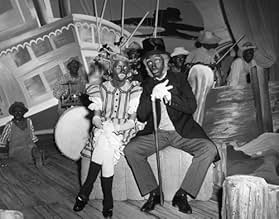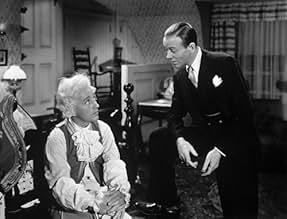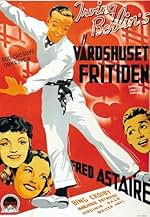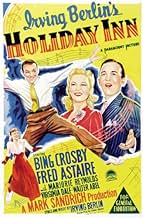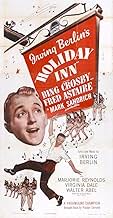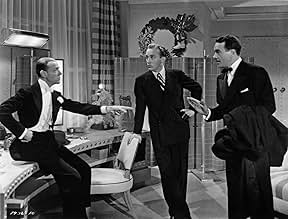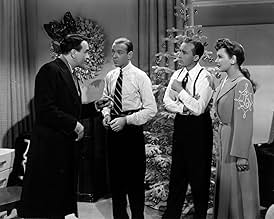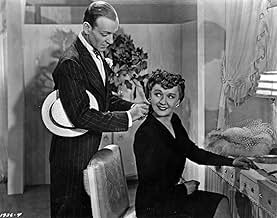AVALIAÇÃO DA IMDb
7,3/10
19 mil
SUA AVALIAÇÃO
Em uma pousada que só abre nas férias, um cantor e outro homem competem pelo afeto de uma bela intérprete em ascensão.Em uma pousada que só abre nas férias, um cantor e outro homem competem pelo afeto de uma bela intérprete em ascensão.Em uma pousada que só abre nas férias, um cantor e outro homem competem pelo afeto de uma bela intérprete em ascensão.
- Direção
- Roteiristas
- Artistas
- Ganhou 1 Oscar
- 3 vitórias e 2 indicações no total
Bob Crosby Orchestra
- Orchestra
- (as Bob Crosby's Band)
Edward Arnold Jr.
- Second Dancer Ted Bumps Into
- (não creditado)
Loretta Barnett
- Dancer
- (não creditado)
Muriel Barr
- Dancer
- (não creditado)
Harry Barris
- Midnight Club Orchestra Leader
- (não creditado)
Patsy Bedell
- Dancer
- (não creditado)
Avaliações em destaque
The source of the song "White Christmas" would be worth watching just for that, but in addition the movie has a bunch of wonderful dancing, and quite a lot of charming songs; "I'll Capture Your Heart Singing", "Come To Holiday Inn", "You're Easy to Dance With", "Oh How I Hate to Get up in the morning", "White Christmas", and "Happy Holiday" (all by Irving Berlin) are some of the highlights.
Anyone who is a fan of Crosby or Astaire will enjoy this movie. Marjorie Reynolds and Virginia Dale play perfect foils for Crosby and Astaire, supporting them.
The plot, what there is of it, is just enough to hang enough Muscial numbers on to keep the movie running along apace.
Anyone who is a fan of Crosby or Astaire will enjoy this movie. Marjorie Reynolds and Virginia Dale play perfect foils for Crosby and Astaire, supporting them.
The plot, what there is of it, is just enough to hang enough Muscial numbers on to keep the movie running along apace.
Everyone has a favourite Christmas movie. For some it's "A Christmas Carol", or "Miracle On 34th Street", perhaps "It's A Wonderful Life", or maybe "How The Grinch Stole Christmas". Even Bing's later "White Christmas" gets aired locally every Christmas Day, while "Holiday Inn" is far more obscure. Yet, this film is my favourite holiday season film. Made long before I was born, I saw it as a child & it had an influence on me. Perhaps the film is dated with its B&W war-time feel but that 1940's elegance is part of the charm. Returning to the "Inn" is like re-visiting old friends at a magical, mythical place. It's a treat to see a younger Bing Crosby (compared with his performance in "White Christmas")& Fred Astaire, as well as the beauty of Marjorie Reynolds. What may not be well known is that the film provided the inspiration for the name of the Holiday Inn chain of motels & hotels. A Memphis businessman named Kemmons Wilson planned a national chain of motels. He hired a draftsman to draw up the plans. It happened that the draftsman watched the movie while he was working, and he sketched the name of it at the top. Wilson saw it, liked it, and stuck with it. Holiday Inn was born & the first opened in August of 1952, some 10 years after the film.
Sure, not all the holidays are treated in the film. And the Independence Day segment contains some war-time "propaganda" with newsreel shots of McArthur, FDR, & military hardware. But this was the era when Hollywood went to war & stars did pitches to audiences to buy war bonds, etc. Yes, the black-face Al Jolson style "Abraham" number causes me to cringe a bit, but the tune is snappy, and the justification is in keeping with the plot as Bing tries to hide Marjorie Reynolds from Astaire. The supporting characters are also fine. There's "Gus" the cab driver for the Inn, whom Bing gives 10 bucks to take a detour to keep Reynold's away from the Inn the night the Hollywood men are there. Bing says for that kind of money Gus should take her by way of "Medicine Hat" (a prairie town in Canada). I also enjoy character actress Louise Beavers portrayal of "Mamie", the Inn's cook. She's not only a mother figure to her two charming kids, but also to her boss. During Thanksgiving, Bing mopes while Astaire & Reynolds are filming in Hollywood together. He puts on a recording of himself singing "I've Got Plenty To Be Thankful For", while he comically criticizes himself - even saying "you're flat". Mamie tells him that all he did was tricks to keep Miss Linda. He was never honest with her & instructs him to go to Hollywood & tell her how he feels. The song "White Christmas" became a huge hit with this movie. It's sung twice. The first time, Bing is teaching it to Reynolds on the piano & they sing a duet with his coaching. The second time, at the end, it's an unplanned duet. Reynolds is singing it on a sound stage "mock-up" of the Inn, once again at a piano. She finds that at the same spot in the song as Bing had done earlier, she picks up his pipe & rings bells on a tree. Then Bing begins to whistle in the wings. Her solo is interrupted as Bing then sings a line or two. The song isn't completed this time! In the later film, Bing sings the immortal song "just like the record". "Easter Parade" was another Irving Berlin hit from this movie. It would inspire another Astaire movie later with that title.
This is not a perfect film but it has been an inspiration to me (& to others). The Inn is timeless. I can always re-visit every year or so & the comedy, songs & dance are eternal. Styles change. If "Jim Hardy's" Holiday Inn had been a real place, it probably wouldn't survive. The resorts of the Catskills, such as those in "Dirty Dancing" fell to changing times. Jim probably would have had to have rock acts in the 1950's (or Rap in the 1990's)! But I can always go home to this Inn & know what kind of enertainment is on tap. And also enjoy Mamie's cooking!
Sure, not all the holidays are treated in the film. And the Independence Day segment contains some war-time "propaganda" with newsreel shots of McArthur, FDR, & military hardware. But this was the era when Hollywood went to war & stars did pitches to audiences to buy war bonds, etc. Yes, the black-face Al Jolson style "Abraham" number causes me to cringe a bit, but the tune is snappy, and the justification is in keeping with the plot as Bing tries to hide Marjorie Reynolds from Astaire. The supporting characters are also fine. There's "Gus" the cab driver for the Inn, whom Bing gives 10 bucks to take a detour to keep Reynold's away from the Inn the night the Hollywood men are there. Bing says for that kind of money Gus should take her by way of "Medicine Hat" (a prairie town in Canada). I also enjoy character actress Louise Beavers portrayal of "Mamie", the Inn's cook. She's not only a mother figure to her two charming kids, but also to her boss. During Thanksgiving, Bing mopes while Astaire & Reynolds are filming in Hollywood together. He puts on a recording of himself singing "I've Got Plenty To Be Thankful For", while he comically criticizes himself - even saying "you're flat". Mamie tells him that all he did was tricks to keep Miss Linda. He was never honest with her & instructs him to go to Hollywood & tell her how he feels. The song "White Christmas" became a huge hit with this movie. It's sung twice. The first time, Bing is teaching it to Reynolds on the piano & they sing a duet with his coaching. The second time, at the end, it's an unplanned duet. Reynolds is singing it on a sound stage "mock-up" of the Inn, once again at a piano. She finds that at the same spot in the song as Bing had done earlier, she picks up his pipe & rings bells on a tree. Then Bing begins to whistle in the wings. Her solo is interrupted as Bing then sings a line or two. The song isn't completed this time! In the later film, Bing sings the immortal song "just like the record". "Easter Parade" was another Irving Berlin hit from this movie. It would inspire another Astaire movie later with that title.
This is not a perfect film but it has been an inspiration to me (& to others). The Inn is timeless. I can always re-visit every year or so & the comedy, songs & dance are eternal. Styles change. If "Jim Hardy's" Holiday Inn had been a real place, it probably wouldn't survive. The resorts of the Catskills, such as those in "Dirty Dancing" fell to changing times. Jim probably would have had to have rock acts in the 1950's (or Rap in the 1990's)! But I can always go home to this Inn & know what kind of enertainment is on tap. And also enjoy Mamie's cooking!
They don't get much better than this: Astaire with the drop dead dancing cool, and Crosby with the honey crooning, both competing for the same gal. Crosby decides to let it all go and settle in the country, then on a whim realizes he can open his country house as a club open on holidays only. The girl he ends up drafting for the floor shows ends up being the love of his life, and the dancing partner Astaire has always been searching for.
Astaire, Crosby, and Reynolds have great chemistry together: I thought it quite convincing how Crosby's overprotective zeal scared Reynolds away for a while, and Astaire was very cool and believable as a kind of an inoffensive opportunist who exploits Crosby's passionate responses to whatever threat he perceives in Astaire.
Top it off with many of Irving Berlin's best classic tunes, performed in interesting interpretations, and you have a very good musical film.
Astaire, Crosby, and Reynolds have great chemistry together: I thought it quite convincing how Crosby's overprotective zeal scared Reynolds away for a while, and Astaire was very cool and believable as a kind of an inoffensive opportunist who exploits Crosby's passionate responses to whatever threat he perceives in Astaire.
Top it off with many of Irving Berlin's best classic tunes, performed in interesting interpretations, and you have a very good musical film.
In Holiday Inn it isn't Bing Crosby or Fred Astair that makes the movie outstanding, but rather the relatively unknown "B" movie star of the time, Marjorie Reynolds. As you watch this movie you can "feel" the mood that Marjorie is portraying at the time, just by the look on her face. For example, during the the "Easter" scene, her eyes and smiles say it all, you can see she is in love, and as she sings "White Christmas" at the end you can feel the sadness of her character - throughout the entire movie she says more with her facial expressions then the most popular movie stars do today in their entire careers... If you love truly good acting, Holiday Inn will make you smile and make you cry, it will bring back memories of a time when ladies could truly dance in high heel shoes, we don't see that type of dancing these days in movies. Picture quality, sound and special effects are not of primary importance in these kinds of films, these are the kind that rely on your own imagination and feelings, much in the way you do when you read a good book.
These older movies serve up so much good feelings they could be used to replace prescription meds for those feeling bad.
These older movies serve up so much good feelings they could be used to replace prescription meds for those feeling bad.
This film is good in so many ways. The song and dance numbers were all great. Teaming Bing Crosby and Fred Astaire was a great idea. These two played off each other so well that I can't imagine two other actors doing so well. Even Crosby and Hope wouldn't have done as well here. Marjorie Reynolds was a treat to look at but also had good chemistry with both Crosby and Astaire. The support cast was equally as good, Walter Abel as Danny Reed, Virginia Dale as Lila Dixon and Louise Beavers as Mamie gave solid performances.
The set was also beautiful. Obviously the Hollywood set of Holiday Inn at the end of the film that was supposed to be a reproduction of the real Holiday Inn in Connecticut is the same set used for both scenes. However it is such a realistic set that the viewer never suspects that the Connecticut scenes were filmed indoors. I think the fact that the film was in black and white helps in that respect. A color film may have actually looked more phoney.
The story is a simple one but well put together. I think many viewers can relate to guys trying to steal girls from one another, its a common enough practice today. The ending is a bit fairy tale like but then that is why so many probably like it. We get enough "reality" in our every day lives. It is nice to escape reality with a film like this.
Lastly, the black face scene during the Lincoln Day performance is offensive but it does not ruin the film. Of course a minstrel show today using black face would be unacceptable in today's environment but you can't hold a 1940's film to the same standards. I know some would like to have that scene removed from the film but I disagree. I am of African American decent and while I could view this film as a disgrace I accept it for what it is. Rather than try and obliterate scenes such as this from our film history I think they should be viewed as stepping stones to where African Americans are in film today. There may still be barriers that need to be broken through in the film world but considering where African Americans started we as a society should also take time to appreciate the accomplishments that have been achieved. Black face is out. Demeaning "yesum" roles are for the most part gone and now leading roles that portray African Americans in well to do positions in society are becoming more and more frequent. So while some of the film history regarding African Americans portrays them in a negative manner it is because of those actors and actresses were able to work in those roles and under those conditions that the modern day African American actors and actresses are able be seen in a more positive light. Ignoring the past roles ignores the actors and actresses that struggled through those times.
The set was also beautiful. Obviously the Hollywood set of Holiday Inn at the end of the film that was supposed to be a reproduction of the real Holiday Inn in Connecticut is the same set used for both scenes. However it is such a realistic set that the viewer never suspects that the Connecticut scenes were filmed indoors. I think the fact that the film was in black and white helps in that respect. A color film may have actually looked more phoney.
The story is a simple one but well put together. I think many viewers can relate to guys trying to steal girls from one another, its a common enough practice today. The ending is a bit fairy tale like but then that is why so many probably like it. We get enough "reality" in our every day lives. It is nice to escape reality with a film like this.
Lastly, the black face scene during the Lincoln Day performance is offensive but it does not ruin the film. Of course a minstrel show today using black face would be unacceptable in today's environment but you can't hold a 1940's film to the same standards. I know some would like to have that scene removed from the film but I disagree. I am of African American decent and while I could view this film as a disgrace I accept it for what it is. Rather than try and obliterate scenes such as this from our film history I think they should be viewed as stepping stones to where African Americans are in film today. There may still be barriers that need to be broken through in the film world but considering where African Americans started we as a society should also take time to appreciate the accomplishments that have been achieved. Black face is out. Demeaning "yesum" roles are for the most part gone and now leading roles that portray African Americans in well to do positions in society are becoming more and more frequent. So while some of the film history regarding African Americans portrays them in a negative manner it is because of those actors and actresses were able to work in those roles and under those conditions that the modern day African American actors and actresses are able be seen in a more positive light. Ignoring the past roles ignores the actors and actresses that struggled through those times.
Você sabia?
- CuriosidadesThe Connecticut inn set for this film was reused by Paramount 12 years later as a Vermont inn for the musical Natal Branco (1954), also starring Bing Crosby, and again with songs composed by Irving Berlin.
- Erros de gravaçãoThe telegram that Ted Hanover receives from Jim Hardy on Christmas Eve is dated December 25th.
- Citações
Linda Mason: My father was a lot like you, just a man with a family. Never amounted to much, didn't care. But as long as he was alive, we always had plenty to eat and clothes to keep us warm.
Jim Hardy: Were you happy?
Linda Mason: Yes.
Jim Hardy: Then your father was a very successful man.
- Cenas durante ou pós-créditosIn the opening titles the main credits for Irving Berlin as composer and lyricist, and Mark Sandrich as producer and director, are each facsimiles of their genuine signatures.
- Versões alternativasIn 2008, the film was restored and colorized by Legend Films.
- Trilhas sonorasOverture
(uncredited)
Music and Lyrics by Irving Berlin
Performed by the Paramount Pictures Studio Orchestra and Chorus conducted by Robert Emmett Dolan
Principais escolhas
Faça login para avaliar e ver a lista de recomendações personalizadas
- How long is Holiday Inn?Fornecido pela Alexa
- What is 'Holiday Inn' about?
- Is 'Holiday Inn' based on a book?
- Where is the Holiday Inn located?
Detalhes
Bilheteria
- Orçamento
- US$ 3.200.000 (estimativa)
- Faturamento bruto mundial
- US$ 80
- Tempo de duração1 hora 40 minutos
- Cor
- Proporção
- 1.37 : 1
Contribua para esta página
Sugerir uma alteração ou adicionar conteúdo ausente

Principal brecha
By what name was Duas Semanas de Prazer (1942) officially released in India in English?
Responda

